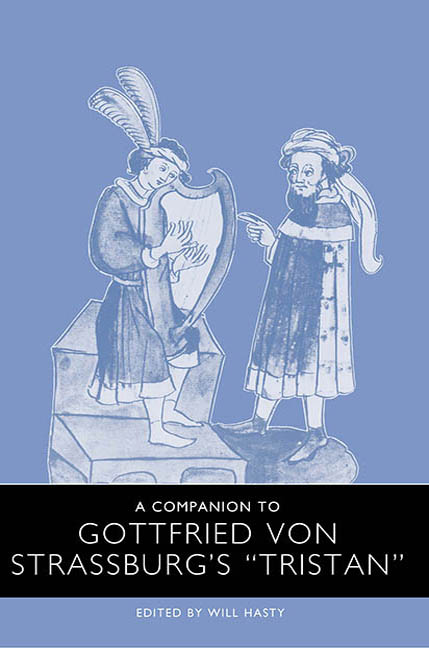Book contents
- Frontmatter
- Contents
- Acknowledgments
- Introduction: The Challenge of Gottfried's Tristan
- I Cultural and Social Contexts
- Humanism in the High Middle Ages: The Case of Gottfried's Tristan
- Gottfried's Strasbourg: The City and Its People
- II Figures, Themes, Episodes
- III Gottfried's Narrative Art
- IV The Medieval and Modern Reception of Gottfried's Tristan
- Notes on the Contributors
- Index
Gottfried's Strasbourg: The City and Its People
from I - Cultural and Social Contexts
Published online by Cambridge University Press: 28 April 2017
- Frontmatter
- Contents
- Acknowledgments
- Introduction: The Challenge of Gottfried's Tristan
- I Cultural and Social Contexts
- Humanism in the High Middle Ages: The Case of Gottfried's Tristan
- Gottfried's Strasbourg: The City and Its People
- II Figures, Themes, Episodes
- III Gottfried's Narrative Art
- IV The Medieval and Modern Reception of Gottfried's Tristan
- Notes on the Contributors
- Index
Summary
By citing “Thômas von Britanje” as his source and by taking issue, so it seems, with Eilhart von Oberge, Gottfried von Strassburg deliberately situates his work in a literary tradition. That is to say, he views his version as one of a succession of treatments of a given material, and there is no reason to doubt that he expected there would be others in the future. He gave for his time the appropriate interpretation of events in the past, and there is also no reason to doubt that he saw Marke, Tristan, and Isolde as historical figures in that past, no matter how indefinite that past may be. However, it must also be borne in mind that Gottfried is himself a historical figure at a particular point in time, and he must therefore be seen, if one is to understand fully the background to the writing of his epic poem, within that historical context. What I propose here is a depiction of the political, social, economic, and cultural situation at the time at which Gottfried was writing, that is, the social and intellectual climate in Strasbourg in the first quarter of the thirteenth century.
In this chapter reference is occasionally made to events after the supposed date of death of Gottfried, on the grounds that existing customs only found formal expression at a much later date, for “traditional practices were later legally confirmed” (“herkömmlich Bestehendes [wurde] nachträglich rechtlich bestätigt,” Winter 28), and also to events that preceded Gottfried's lifetime and were the basis for the intellectual climate in which he lived. However, I make only passing reference to the remoter history of the city, since one must distinguish, as far as the historical Strasbourg is concerned, between what we now know of its history and what Gottfried may be assumed to have known at the time. Gottfried would not, for example, have had access to the information, scanty as it is, that has become available in the centuries since his death about the Roman occupation of the city, and he would presumably have accepted one of the legends about the founding of the city, such as that incorporated into Jakob Twinger von Königshoven's chronicle (ca. 1400).
- Type
- Chapter
- Information
- A Companion to Gottfried von Strassburg's Tristan , pp. 55 - 70Publisher: Boydell & BrewerPrint publication year: 2003



